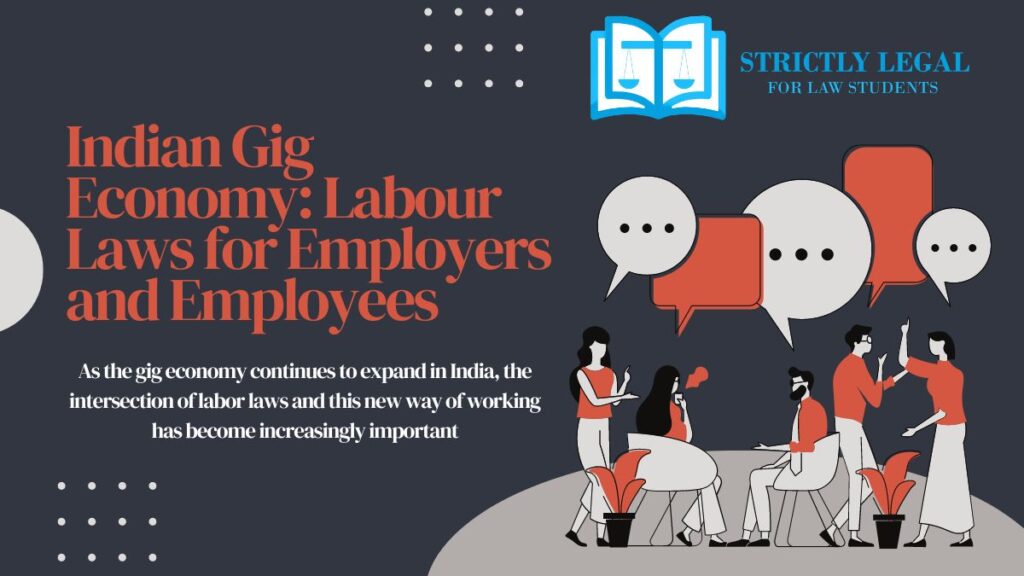As the gig economy continues to expand in India, the intersection of labor laws and this new way of working has become increasingly important. The gig economy refers to a labor market characterized by short-term contracts or freelance work rather than permanent jobs. In this article, we will explore how Indian labor laws affect employers and employees in the gig economy.
Table of Contents
Understanding the Gig Economy: Defining the New World of Work.
The gig economy is a term that has gained a lot of attention in recent years. It refers to a labour market characterized by short-term contracts or freelance work, often facilitated by online platforms. This type of work has become increasingly popular among workers seeking flexible schedules and the ability to work from anywhere while providing businesses with a cost-effective and scalable workforce. In this article, we will explore the concept of the gig economy and its impact on the world of work.
The term “gig” originally referred to a musical performance, but it has since been adopted to describe any type of short-term job. In the gig economy, workers are often referred to as “gig workers” or “independent contractors” rather than “employees” since they are not typically entitled to the same benefits and protections as traditional employees. Instead, gig workers are responsible for their own taxes, insurance, and other expenses.
One of the key features of the gig economy is the use of online platforms to connect workers with businesses or individuals who need their services. Examples of these platforms include Uber, Lyft, and TaskRabbit, which allow users to easily hire drivers, cleaners, and other service providers on a per-job basis. These platforms have made it easier for individuals to enter the gig economy and find work, but they have also been criticized for creating a race to the bottom in terms of wages and working conditions.
Here several pros and cons of the Gig Economy:
| PROS | CONS |
| Flexibility | Lack of worker protections |
| Variety Of Work | Limited Bargaining Power |
| Control Over Income | Difficulty accessing benefits |
| Potential for Entrepreneurship | Lack of stability and predictability in work |
| Access to New Markets and Opportunity | Unequal pay compared to traditional employees |
| Work-Life Balance | No guarantee of steady work or income |
Despite these challenges, the gig economy shows no signs of slowing down. In fact, it is estimated that by 2023, over half of the US workforce will be participating in some form of gig work. This trend has significant implications for the future of work and the economy as a whole.
In conclusion, the gig economy is a complex and rapidly evolving phenomenon that is changing the way we work and do business. While it offers many benefits, it also poses significant challenges for workers and society as a whole. As we navigate this new world of work, it is important to consider the implications of the gig economy and work towards creating a fair and sustainable labour market for all.
The Gig Economy and Indian Labor Laws
The gig economy has been growing at a rapid pace in India, thanks to the country’s large and growing pool of talented, tech-savvy young people. According to a report by the International Labour Organization (ILO), India is the second-largest market for the gig economy after the United States.
However, the rapid growth of the gig economy has created new challenges for Indian labor laws. Here are the challenges:
- Traditional labor laws were designed for an era when most workers held permanent jobs with long-term contracts.
- The gig economy, on the other hand, is characterized by short-term contracts and freelance work.
- This difference in work arrangements has made it difficult to apply traditional labor laws to the gig economy.
As a result, gig workers may not have the same legal protections and benefits as traditional employees. Indian labor laws may need to be updated better to accommodate the unique needs and challenges of gig workers.
The government of India has taken steps to address these challenges, but there is still much work to be done. In 2017, the government passed the Code on Wages, which consolidated four labor laws related to wages into a single law. The code includes provisions related to minimum wages, overtime, and other issues that are relevant to the gig economy.
However, there is still no comprehensive legal framework for the gig economy in India, which means that many workers and employers are operating in a legal gray area.
How Indian Labor Laws Affect Employers in the Gig Economy
Employers in the gig economy are facing a number of challenges related to Indian labor laws. One of the biggest challenges is classification: whether a worker is classified as an employee or an independent contractor can have significant implications for the employer.
If a worker is classified as an employee, the employer is responsible for providing benefits such as health insurance and paid time off. The employer must also pay taxes on the worker’s behalf, including Social Security and Medicare taxes. In addition, employers must follow minimum wage and overtime laws.
On the other hand, if a worker is classified as an independent contractor, the employer is not responsible for providing benefits, and the worker is responsible for paying their own taxes. However, the employer may still be liable for injuries or other damages caused by the worker.
Employers in the gig economy must carefully navigate these legal issues to avoid potential liabilities. In addition, they must ensure that their contracts with workers are compliant with Indian labor laws, including provisions related to minimum wage and overtime.
How Indian Labor Laws Affect Employees in the Gig Economy
Employees in the gig economy also face unique challenges related to Indian labour laws. One of the biggest challenges is job security. Because gig economy workers are typically employed on a short-term basis, they may not have the same job security as traditional employees.
In addition, many gig economy workers are not eligible for benefits such as health insurance or retirement plans. This can make it difficult for them to save for the future and protect themselves in case of an emergency.
Another challenge for gig economy workers is ensuring that they are paid fairly. Because they are often paid on a project-by-project basis rather than an hourly or weekly wage, it can be difficult to ensure that they are being paid a fair rate.
Overall, Indian labor laws are still evolving to meet the needs of the gig economy. While there have been some positive developments, such as the Code on Wages, there is still much work to be done to ensure that both employers and employees are protected.
Under Indian labour laws, gig workers are classified as independent contractors and not full-time employees. This means they are not entitled to the same benefits and protections as permanent employees.
Employers in the gig economy are required to comply with all applicable labour laws and regulations, including minimum wage laws, discrimination laws, and health and safety standards.
Gig workers are not entitled to minimum wage or other benefits, such as paid leave or retirement benefits, under Indian labour laws. However, some gig economy platforms offer benefits such as health insurance and retirement plans to their contractors.
Yes, gig workers have the right to unionize under Indian labour laws. However, due to their status as independent contractors, it can be challenging for them to form unions and negotiate collective bargaining agreements.
Employers who misclassify workers in the gig economy may be subject to penalties and fines for violating labour laws. They may also face lawsuits from workers seeking back pay and benefits.
Debasmita Kundu is an aspiring writer and beginner WordPress developer based in India. She has a Bachelor’s degree in English Literature and is currently pursuing a Master’s degree in Journalism and Mass Communication.
With a strong interest in technology and a passion for writing, Debasmita is exploring the world of WordPress development and learning new skills to build beautiful and functional websites. She enjoys experimenting with different themes, plugins, and customization options to create unique websites that stand out from the crowd.
As a beginner in the field of WordPress development, Debasmita is eager to learn and grow and is excited about the possibilities that this field offers for creativity and innovation.





